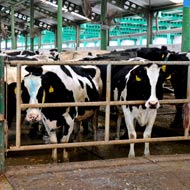NOAH defends farm antibiotic use

Medical experts made "a number of inaccurate points" about the use of veterinary medicines, according to NOAH.
The National Office of Animal Health (NOAH) has defended the veterinary industry's use of antibiotics in farming in a recent letter published in The Times.
NOAH responded to an earlier letter from the president of the Royal Society of Medicine and other academics. In it, they called for "political action against the overuse of antibiotics in farming" (The Times, 23 November).
Medical experts made "a number of inaccurate points" about the use of veterinary medicines, according to NOAH.
Chief executive Dawn Howard said: "Whilst it is encouraging that Antibiotic Awareness Week has sparked a debate in the national press, it’s important that everyone considers the wider context.
“We were particularly keen to point out the danger of quoting ‘total use’ figures for antibiotics on farms.
"There are significantly more individual animals in a country than individual humans, for example, and antibiotics are prescribed according to weight, which of course will result in a 600kg dairy cow requiring more antibiotic to treat an infection than an 80kg person.
"The letter from the Royal Society of Medicine failed to mention this."
NOAH's responding letter made mention of a recent one health report published by Public Health England and the Veterinary Medicines Directorate. This showed that in the UK, overall human use of antibiotics in 2013 was 2.4 times that of veterinary use, based on kg per biomass.
Dawn added: "We will continue to stand up for our industry providing the essential medicines that are needed by responsible hard-working vets and farmers to maintain high standards of animal health and welfare, thus contributing to the continued availability of safe, affordable food for everyone."



 The RCVS has announced a new version of its 1CPD mobile app, with enhanced features for veterinary surgeons and veterinary nurses to record their continuing professional development.
The RCVS has announced a new version of its 1CPD mobile app, with enhanced features for veterinary surgeons and veterinary nurses to record their continuing professional development.